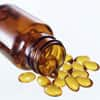Meta-analysis results indicate blood pressure reduction benefit for EPA/DHA
Tuesday, April 1, 2014. The results of a meta-analysis published online on March 6, 2014 in the American Journal of Hypertension add evidence to a blood pressure-reducing effect for the omega-3 polyunsaturated fatty acids eicosapentaenoic acid (EPA) and docosahexaenoic acid (DHA).
Paige E. Miller and colleagues analyzed seventy randomized trials that compared the effects of EPA and/or DHA to a placebo. The average dose of EPA plus DHA was 3.8 grams per day, which was supplied by fish oil in the majority of the studies.
Analysis of hypertensive subjects who were not receiving treatment for their condition found an average reduction of 4.51 mmHg in systolic blood pressure and a 3.05 mmHg reduction in diastolic pressure among those who received EPA and DHA in comparison with a placebo. In the meta-analysis of all studies, EPA plus DHA was associated with an average reduction in systolic and diastolic blood pressure of 1.52 mmHg and 0.99 mmHg. When the analysis was restricted to EPA/DHA from supplements alone, systolic blood pressure was lowered by an average of 1.75 mmHg and diastolic by 1.11 mmHg. Diastolic blood pressure was found to be significantly reduced when the dosage of EPA/DHA exceeded two grams per day.
"The results from our analysis demonstrate that EPA+DHA are as effective, and in some cases more effective, than other lifestyle-related interventions, including increasing physical activity and restricting alcohol and sodium, for lowering blood pressure among hypertensive populations not taking antihypertensive medications," the authors note. "Lowered systemic vascular resistance through changes in endothelial function is considered a primary mechanism by which EPA+DHA may lower blood pressure."
"Although less data are available that examine EPA+DHA–rich or –fortified food and blood pressure outcomes, EPA+DHA–rich or –fortified foods were less effective than supplements with regards to lowering blood pressure," Dr Miller and her associates observe. "From a clinical and public health perspective, provision of EPA+DHA may lower blood pressure and ultimately reduce the incidence of associated chronic diseases," they conclude.
|
 |
What's Hot
The April 1, 2013 issue of the American Journal of Physiology – Regulatory, Integrative, and Comparative Physiology published the results of a double-blinded trial which found a reduction in the adverse reaction to mental stress in men and women given fish oil.
"Despite the well-documented link between mental stress and cardiovascular risk, no study has examined neural cardiovascular reactivity to mental stress after fish oil supplementation," authors Jason R. Carter of Michigan Technological University and his coauthors note in their introduction.
The study included 67 nonhypertensive men and women whose age averaged 24 years. The participants were divided to receive 9 grams fish oil or 9 grams olive oil daily for eight weeks. Before and after the treatment period, the subjects underwent assessment of resting heart rate, blood pressure, muscle sympathetic nerve activity, and forearm and calf blood flow, followed by reassessment during a situation created to induce mental stress.
While resting assessments did not differ significantly between the groups by the end of the study, those who received fish oil experienced reductions in heart rate reactivity and total muscle sympathetic nerve activity in response to stress in comparison with the olive oil group. The finding suggests that fish oil could help protect the cardiovascular system during stress, and may be one of several reasons why it helps maintain heart health.
"Overall, the data support and extend the growing evidence that fish oil may have positive health benefits regarding neural cardiovascular control in humans and suggest important physiological interactions between fish oil and psychological stress that may contribute to disease etiology," the authors conclude. "Future studies might examine the influence of longer duration (i.e., chronic) fish oil supplementation on neural cardiovascular reactivity to mental stress, with a particular focus on aged and/or diseased populations." |

|
Latest Products |
 |
Disease Prevention and Treatment ebook
Item #DPT05
 |
|
Imagine, over 1,400 pages of breakthrough information that bridges the gap between cutting-edge science and mainstream medicine … in one must-have eBook, an easily accessible and searchable format that you can take with you. This is information you simply won't find anywhere else, published by an organization passionate about keeping you younger and healthier longer.
Within the pages of Disease Prevention and Treatment, you'll find the latest scientific strategies for managing a wide range of conditions — from cancer and cardiovascular disease to arthritis and neurological disorders. You'll also learn how to use natural compounds, hormones, novel pharmaceutical agents, and preventive blood testing to complement mainstream therapies and improve your chances of controlling serious diseases. No other book on the market does all this!
After all, it's been our mission for over 34 years to provide you with this kind of lifesaving information. So we've packed the Disease Prevention and Treatment eBook with the latest evidence-based protocols addressing 130 different health concerns. All documented by thousands of published studies from prestigious scientific journals, with detailed suggestions that can help you break free of the "one-size-fits-all" approach to disease management. |
| |
 |
|
Scientists have developed a new weapon in the fight against aging skin. A combination of three powerful peptides works at the cellular level to breathe new life into aging and damaged skin. By mimicking the action of the body's own natural regenerative activities, the ingredients in Advanced Triple Peptide Serum have been shown in clinical studies to defend against the visible signs of skin aging.
Peptides are the natural choice for restoring damaged, aging skin. These nontoxic, anti-aging substances:
- Trigger increased collagen production
- Enhance antioxidant defense
- Improve cellular repair
Research has now pinpointed three peptides with particularly potent effects. The result is a softer, smoother, more radiant youthful-looking skin.
|
|
 |
Related Articles
|
|











